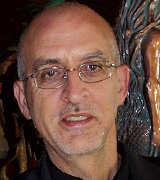The global village

Dimitri C. Michalakis
There are recent arrivals from Greece in a steady stream, and Greeks arriving from other parts of the world, but the last great Greek immigrant wave to the United States is more than fifty years old (America in the McCarthy era) and the hybrid generation of those born here in those days, and those who immigrated here as children (like me), is rapidly aging and going through some retrospection.
What we brought to our brave new world is still a sense of wonder at the wonder of America and our great luck in being here: the Statue of Liberty still represented the miracle of our journey and how big we found everything here: the big cars, the big homes, the big lunchboxes we took to school filled with all sorts of snacks unimaginable in Greece, the big television sets with the plethora of cowboy shows, the six-shooters you got for Christmas presents so you could be a real American cowboy, the communities of Greeks throughout the United States where we were Greek (with the local church and parochial school as our anchor and a family of Greeks we knew on every block), but where we were also proudly American, singing the Star Spangled Banner along with the Greek national anthem, rooting for the local sports teams (the woe-begotten Cubs and Bulls of those days and rooting for the Black Hawks) and then setting wing after Greek parochial school to enroll at a real American high school and university and become a dentist, a lawyer, a bank president, the guy who works with the mayor in City Hall. A real American with a real Greek American wife who looks like the wife of any of the astronauts and with kids who might have an accent but a Brooklyn or an Oak Park accent.
The people of my generation now go to functions and banquets and weddings and christenings and we get too hot and we drink too much and we get sleepy on the drive home, and we wonder if we should have gone because long car trips make us sleepy now, but still we get up early the next day because we’re conditioned to work that way, as though we have so much still to do, while our kids sleep late, shocking us by sleeping well into the afternoon, and yet having careers and salaries and responsibilities we could hardly imagine, and yet taking their Caribbean vacations to unwind, and for the moment daring to give up comfortable homes for cluttered and uncomfortable (to us) studio apartments and lofts.
Our kids are very much settled in the United States, and yet they don’t share our insularity: you see them volunteering to teach kids English in Morocco, and build houses in Guatemala, and trek through the mountains of Tibet, and go back to the village and rebuild the old family rookery, and eat Thai food and Indian food in their own neighborhood and make Greek food trendy—with seemingly a trendy Greek restaurant opening every year in every trendy American neighborhood (with trendy décor and trendy dishes with the prices to match).
The world that we left behind to become residents of this great continent of America—what seemed to be our personal island of refuge—is now become one world (through the vast tentacles of social networking) and we all have become its citizens—a cycle of history and a lesson we are leaning from our own children.












0 comments